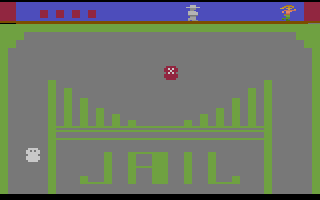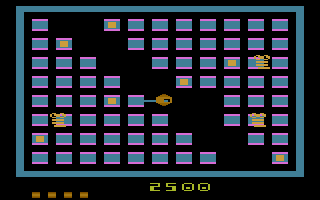

... Mark Hahn
By Scott Stilphen
DP: How did you
get your start at Atari?
Mark Hahn:
Right after college I worked for a small, embedded systems company named
Digitron (now out of business). I learned a bit about programming
microprocessors there. Most of what we did used the 8080, but I did get a little
exposure to the Apple II.
I kind of stumbled into computer consulting after that. I have worked about half
of my career as a consultant. I worked as a consultant for NY Telephone and
Mobil Oil, among others, before becoming an employee at Atari. The gig at Atari
was kind of a fluke. I had been consulting for some friends and they went out of
business. When they went broke, they owed me quite a bit, and I needed a job
fast to pay my rent. At this point I was living in Manhattan. I checked the want
ads in the Sunday NY Times and found 2 ads for a 6502 programmer. One was with
Children's Television Workshop (of Sesame Street fame); the other was with a new
office Atari was opening in NY. I got offers from both, but the Atari offer was
almost twice as much money, so I went there.
 DP:
I’m aware of 3 games that you did: Dukes of Hazzard, Pengo, and Elk Attack.
Starting with DoH, what was the reason that it was never released? I have a
copy of the game (from Best Electronics in CA) and it seems nearly complete.
DP:
I’m aware of 3 games that you did: Dukes of Hazzard, Pengo, and Elk Attack.
Starting with DoH, what was the reason that it was never released? I have a
copy of the game (from Best Electronics in CA) and it seems nearly complete.
Mark Hahn:
Dukes was never released because it sucked. I just wish
someone had told me that when I was programming it. There was a lot of
competition between the NY and CA offices. Nobody from marketing (which was in
CA) was willing to tell me they didn't like the game. So I did demos of several
screens, they said they liked them, and then I got working on game play. I only
found out they did not intend to release it from some marketing VIPs secretary.
I had put months of very long days and weekends into the game. I was a bit
upset.
When I say the game sucked, I mean it didn't look as good as the games Atari was
trying to produce at that point. I think the game play in Dukes was pretty good.
The game was sort of designed by committee. By design, I mean the main features
of the game: you will control a car, you will need to evade the police, you have
to jump over obstacles, the background will scroll, etc. The graphical look, the
game logic, and all the programming were left up to a single programmer, me in
this case. None of us really knew what we could do with the 2600. All the
technical staff in NY had never programmed the 2600. So the game was pushed in a
direction that made good graphical resolution impossible. In defense of the
group that designed Dukes, we didn't have a lot of examples of what the VCS
could do at that point, and it was very hard to get any examples from the CA
office.

DP: There are quite a few levels. How many are there?
Mark Hahn:
The number of levels could be pretty huge. I originally wanted to have
256 levels. That was one of the justifications I used for going to 16K of ROM.
To the best of my knowledge, Dukes was the first 16K cart ever produced at
Atari. In fact, I had to wire-wrap a prototype to be able to demo the game.
Hardware engineers in CA had managed to produce a 16K prototype, but it was huge
and took an external power supply. In my design, I gave up a few memory
locations and managed to drop a few chips from the circuit. Some of my circuit
was later used in proto cards that used the SARA chip.

DP: You're probably right. Far as I know, Dig Dug was the 1st 16K game released by Atari, late in '83 (which was followed by Crystal Castles and Millipede shortly after) and first shown at the 83 Summer CES show. Dukes of Hazzard was mentioned in a late '82 issue of the Atari Age magazine.
Pengo is a great translation of the Sega classic. I happen
to have a prototype of this, which is different from the release version in some
aspects - most notably with the title screen (the proto has an “arcade-style”
title font, and the Pengo character is stationary). I’m curious as to why the
arcade font wasn’t kept- was it due to memory constraints?

Mark Hahn:
The arcade style font was dropped because it took up too much ROM. Pengo was an 8K cartridge, and I was crunching bytes on that game till the last
minute.
DP: Were Dukes
and Pengo the only 2 games you did for Atari? Did you have any other games that
you worked on that either didn’t get finished or released?
Mark Hahn: I did a couple of screens for a submarine warfare game that another game designer had written for the Atari 800 and the Apple II, but I don't remember the name (Ed: possibly Final Legacy?). I helped with sounds on a few other cartridges, mostly by doing some work on a tool that allowed our sound designer, Andy Fuchs, to play with sounds in an interactive fashion.
DP: Were the
games that you wrote ones that were chosen or assigned?
Mark Hahn: Dukes was assigned to me. Pengo was a title that Atari had bought the home game system rights to, but nobody wanted to try the conversion. The original arcade machine had a z80, 32K of ROM and 32K of RAM, etc. I prototyped a few screens and brought them to management. They liked what I'd done, got buyoff from marketing, and off I went.
 DP: I heard that
Elk Attack took you 3 months to write, and was based on Taito’s Electric Yo-Yo,
correct?
DP: I heard that
Elk Attack took you 3 months to write, and was based on Taito’s Electric Yo-Yo,
correct?
Mark Hahn:
Yes. We had a Yo-Yo machine in the NY office. I spent many
hours late at night playing that game while I was waiting for my assemblies to
finish, or downloading test code.
The history of Elk Attack is not very interesting. In the spring of 1987,
finding myself unemployed, I wrote a VCS game based very loosely on Yo-Yo. Those
things that were easy to do I did; those that were hard, I changed or dropped. I
named my cart Elk Attack as a joke and sent the cart to Atari and Epyx for them
to evaluate. Neither were interested, so I stuffed my test EPROMS in a drawer
and forgot them until I ran across the STELLA emulator. Brad Mott had a
wonderful emulator but no binaries to distribute with it. I gave him permission
to include Elk Attack with distributions of STELLA.
DP: What
equipment did you use to program it?
Mark Hahn: I used a Microtek Mice-II In Circuit Emulator and a PC as my development system.

DP: It appears you used some code from Pengo...
Mark Hahn: The hardest part of Elk Attack was getting the screens to look the way I wanted them to. I started with some screen code I had written for Pengo and modified it quite a bit. I re-used very little code from Pengo, but it I did use parts of the Pengo code to prototype things I was working on in Elk Attack.
DP: Do any of your other games have any glitches in them?
Mark Hahn:
No ... my code is bug-free ... not! I'm not aware of any bugs in Pengo
that the user would see. There are numerous bugs in Dukes, but it was never
finished. Elk Attack has an extra scan line bug in it somewhere. Under just the
right (or is it wrong) conditions it will put out an extra scan line (193
instead of 192, some TVs will roll the picture when this happens). Since I never
sold Elk Attack to anyone, I never bothered to fix that bug.
DP: Any hidden Easter eggs in your games?
Mark Hahn: Nope. Never had the room. I have my initials in a few unused bytes at the end of Elk Attack.
DP: Any other
versions of your games that you know of (like Pengo)?
Mark Hahn: There may have been 2 versions of Pengo that became pre-production prototypes, the one with arcade style text, and another version that was almost the finished game.
DP: How was it
working for Atari?
Mark Hahn: It was great and it was terrible. Howard Warshaw has done some video documentaries on what it was like, but I refuse to pay Howard for a copy (and he won't cough up a review copy, at least not for me).
DP: What are some of your favorite games?
Mark Hahn:
Robotron - all time best. Also Doom and Duke Nukem.
DP: Ever see any of your fellow ex-Atari programmers?
Mark Hahn: I haven't seen any of them in years. I know Christopher Omarzu very well, and I trade email with a few of them from time to time, but many still live in the bay area, and I just don't get down there too often.
DP: Have you
attended any of the “retro” gaming conventions, such as Classic Gaming Expo, or
have any interest in doing so?
Mark Hahn: Nope, I guess I'd be interested in going to one if I had the time.
DP: Between your days at Atari and the present, what have you been doing with yourself? Still involved in the game industry?
Mark Hahn:
I haven't done any real game programming since Atari. I do a lot of
embedded systems programming these days. Not as much fun as games, but usually
not as stressful.
| GAMEOLOGY |
| GAME | SYSTEM | COMPANY | STATUS |
| Dukes of Hazzard | Atari VCS/2600 | Atari | unreleased |
| Pengo | Atari VCS/2600 | Atari | released |
| Elk Attack | Atari VCS/2600 | Atari | unreleased |
| "submarine game" | Atari VCS/2600 | Atari | not completed |